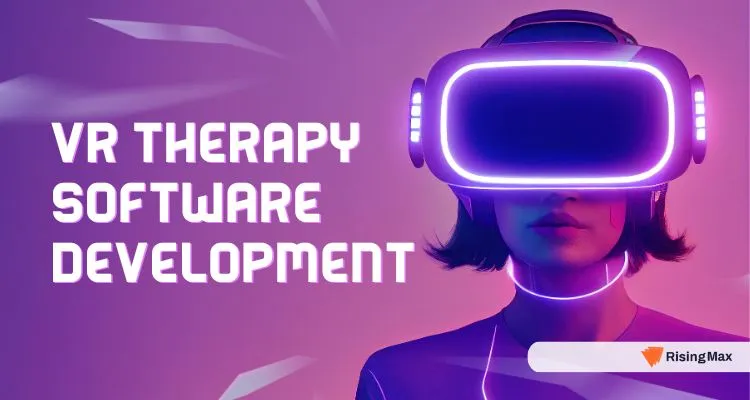The use of virtual reality (VR) technology has been gaining traction across a number of industries, and the field of mental illness is one where it is particularly promising. Virtual reality therapy software development is revolutionizing how mental health issues are treated by providing individualized, immersive experiences that boost patient participation and improve treatment results.

VR therapy software development appears to have a bright future. VR therapy is growing in sophistication, immersion, and accessibility as technology develops. RisingMax Inc. opens doors in this area for creative solutions that transform mental healthcare and enhance the lives of those who suffer from mental illnesses.
Understanding VR Therapy Software Development
Before diving into the specifics, let’s define what VR therapy software development entails. The development of applications and programs that use virtual reality technology to provide therapeutic interventions for any health disorders is referred to as VR therapy software. With the help of these apps, patients participate in regulated therapeutic experiences in realistically rendered virtual settings.
VR therapy software entails integrating state-of-the-art equipment, including haptic feedback, motion sensors, and virtual reality headsets. Together, these technologies give users a virtual world that can be customized to meet their unique therapeutic needs while also giving them a sensation of presence and immersion.
With its ability to provide individualized, immersive, and successful interventions for a variety of mental health issues, virtual reality therapy software development is transforming the area of mental healthcare. VR therapy software can completely change how we provide mental healthcare by improving patient engagement, delivering focused interventions, and giving real-time feedback.
Though there are still obstacles to be solved with current healthcare systems, VR therapy software development appears to have a bright future. VR therapy software will play a crucial role in mental healthcare as technology develops and becomes more widely available, enabling people to take charge of their mental health and lead longer, happier lives.
Want to bring virtual therapy to a new level?
Partner up with RisingMax to benefit from our years of experience in healthcare as well as proficiency in implementing immersive software and highly realistic 3D visuals.
Perks Of VR Therapy Software In Illness Treatment
Virtual therapy software is a promising tool for mental health experts since it has various advantages over traditional types of therapy. We have mentioned some main advantages of employing VR therapeutic software.
Improving Patients Involvement
For any treatment intervention to be successful, patient engagement is essential. By adding dynamic and entertaining game-like aspects, virtual reality therapy software increases patient involvement. Patients are more likely to be motivated and actively engage in their therapy when they feel like they have a voice and agency in the virtual setting.
Tailored & Focused Interventions
The capacity of VR therapeutic software to provide focused and customized therapies is one of its main benefits. The virtual settings and scenarios can be customized by therapists to meet certain therapeutic objectives and difficulties. With this degree of personalization, patients can interact with scenarios that are very similar to their own circumstances, leading to more successful and efficient treatment.
Instantaneous Input & Tracking
VR therapy software also has the benefit of real-time monitoring and feedback. Therapists can collect information on patients’ physiological reactions and behaviours during therapy sessions by incorporating sensors and tracking devices. This information can be utilized to evaluate the effectiveness of treatment, modify therapeutic regimens, and give patients individualized insights.
Accessible & Economical
In the long term, VR therapeutic software may prove to be an affordable and accessible alternative despite the initial expense of implementation potentially acting as a barrier. VR equipment costs are anticipated to drop as the technology gains traction and production increases, making it more accessible to patients and healthcare professionals.
Also Read: How To Make VR App
Enticing Features Of Our Virtual Reality Therapy Software
These detailed aspects showcase how these features go beyond surface-level descriptions, providing a comprehensive understanding of their functionality within VR therapy software.
Biofeedback Integration
VR therapy software monitors real-time physiological data, such as heart rate and skin conductance, providing users with immediate feedback. This dynamic approach enhances self-awareness and empowers individuals to manage stress effectively during immersive therapeutic experiences.
Interactive Activities
Tailored exercises within virtual reality therapy environments engage users, adapting difficulty based on health progress. These interactive activities promote active participation, making VR therapy engaging and effective for achieving therapeutic goals.
Therapist Monitoring & Control
Enabling remote observation, therapists monitor sessions and dynamically adjust virtual environments. This feature ensures personalized interventions, enhancing the therapeutic process by allowing therapists to adapt scenarios based on user reactions for optimal outcomes.
Immersive Environments
Creating realistic and diverse virtual settings enhances the therapeutic experience, transporting users to calming or challenging scenarios. Immersive environments contribute to the effectiveness of various therapeutic approaches by fostering a deeper connection between users and their virtual surroundings.
Progress Tracking
Recording and analyzing user progress over time allows for personalized therapy plans. This feature provides a comprehensive view of the individual’s journey, facilitating evidence-based assessments and adjustments for more effective and targeted interventions.
Customizable Settings
Tailoring virtual experiences to individual preferences ensures a personalized therapeutic approach. Customizable settings accommodate diverse user needs, enhancing the software’s adaptability and promoting a sense of ownership over the therapeutic process.
Guided Narratives
Incorporating guided storytelling within VR therapy scenarios provides a structured framework for addressing specific therapeutic objectives. These narratives guide users through meaningful experiences, fostering introspection and aiding in the exploration of emotions and behaviours.
Cognitive Behavioral Therapy Modules
Integrating CBT principles and exercises within VR therapy offers practical tools for managing thoughts and behaviours. These modules facilitate skill-building, allowing users to apply CBT techniques in a virtual context reinforcing therapeutic concepts in a practical and immersive way.
Social Interaction
Facilitating virtual group therapy within VR environments promotes social skills development. Users engage with avatars, enhancing real-world interactions by practising communication and interpersonal skills in a controlled and supportive virtual setting, fostering a bridge between the virtual and physical worlds.
Also Read: AR/VR App Development Cost
VR Therapy Software Development Uses For Health Treatment
There are several uses for VR therapeutic software development in the realm of mental health treatment. Let’s examine some of the main areas where virtual reality therapy is having a big influence.
Anxiety & Phobia Disorders
Virtual reality therapy software is especially useful in treating phobia and anxiety disorders. Therapists assist patients in a safe and controlled manner during exposure therapy by building realistic virtual settings that mimic anxiety-inducing circumstances. Patients’ quality of life is enhanced, and their symptoms of anxiety are lessened when they face and control their fears with the support of this progressive exposure.
Post-Traumatic Stress Disorder
PTSD is a complicated mental illness that frequently has to be treated by a professional. With VR treatment software, terrible events are virtually recreated, providing a novel way to treat post-traumatic stress disorder (PTSD). Patients can lessen the severity of their symptoms and speed up the healing process by processing and reframing their traumatic experiences with the help of controlled exposure therapy.
Drug & Alcohol Abuse Treatment
Rehabilitation from substance misuse can be difficult, and relapse rates are frequently high. Virtual reality therapy software is extremely helpful in helping people on their road to recovery. Therapists can lessen the chance of relapse by helping patients develop coping mechanisms and resilience by simulating high-risk situations with realistic scenarios.
Depressive Mood Disorders
Virtual reality therapy software is helpful in the treatment of depression and mood disorders. Therapists can assist people with mood disorders in having moments of happiness, calm, and empowerment by designing immersive settings that encourage good emotions and involvement. This may support elevated motivation, happier moods, and greater well-being.
Cognitive Retraining
People with brain injuries or neurodegenerative illnesses frequently require cognitive rehabilitation. Virtual reality therapy software offers focused cognitive exercises that enhance memory, attention, and cognitive function. Therapists can support cognitive recovery and encourage neuroplasticity in their patients by immersing them in dynamic and stimulating virtual worlds.
Also Read: AR/VR Development Companies In Australia
VR Therapy Software Development Process We Follow
Throughout development, we maintain open communication with mental health professionals and clients to ensure the VR therapy software aligns with therapeutic goals and provides a positive and effective user experience.
Requirement Analysis
Clearly outline the therapeutic goals and user requirements for the VR therapy software. Our team works closely with mental health professionals to understand their needs and insights. We identify hardware and software specifications for an optimal VR experience.
Prototyping & Design
Our team develops initial wireframes to visualize the software’s structure and user interface. We design an intuitive, user-friendly interface that promotes engagement and ease of use. Also, we build interactive prototypes to validate design concepts with stakeholders and potential users.
Development Phase
Our experts select appropriate VR platforms and devices based on the target audience and goals. We develop software components, ensuring compatibility with various VR hardware. Build realistic and diverse virtual environments aligned with therapeutic objectives.
Testing & Quality Assurance
Our testers verify that all features work as intended, including biofeedback integration, interactive activities, and therapist monitoring. Our QA experts conduct thorough testing with actual users to gather feedback on usability, engagement, and overall experience.
Therapeutic Principles Integration
Our team implements cognitive-behavioural therapy (CBT) principles and exercises within the VR environment. We integrate guided storytelling and scenarios to address specific therapeutic goals. Develop features that facilitate virtual group therapy, enhancing interpersonal skills.
Optimization & Deployment
Lastly, we fine-tune the software for optimal performance, minimizing latency and ensuring smooth user experiences. Our team implements robust data security measures to protect user privacy. We develop a deployment strategy, considering user onboarding, training, and ongoing support.
Choosing RisingMax Inc. For Virtual Therapy Software Development
RisingMax possesses a broad spectrum of experience regarding the application of VR therapy solutions. We provide full-cycle development, advice on compliance, solution design, and architecture adjustments. Our team develops a product, builds a VR therapy software solution design from scratch, and then scale and integrate your therapy product.
Here’s why we are the right business partner;
- Unmatched domain experience
- Hands-on with VR software and app development
- Customized VR solutions
- Flexible hiring model
- Affordable post-deployment services
Now is the right time to recognize and embrace the tech trend to gain a competitive edge. So, why wait?
Connect with our experts and share your VR therapy software requirements today!












